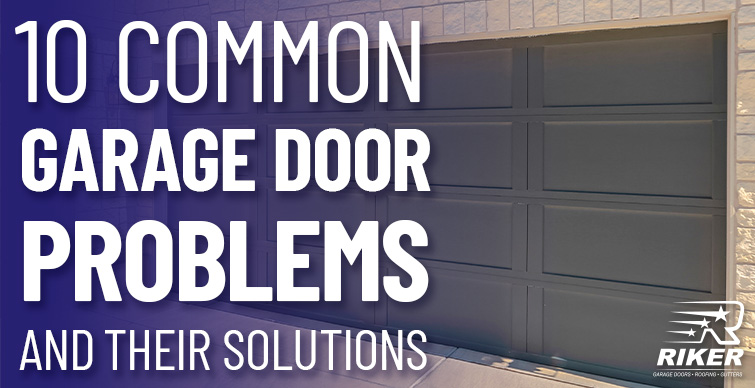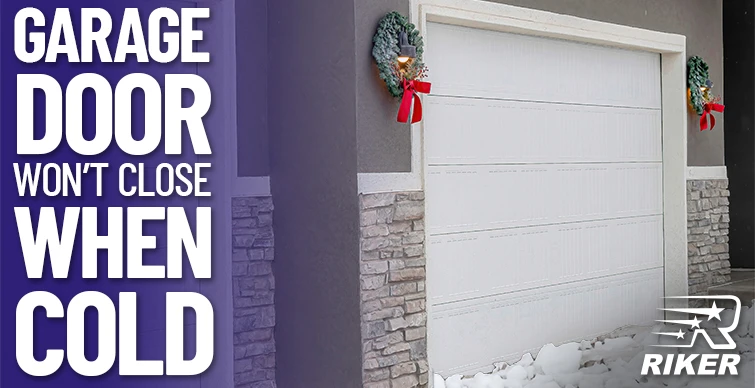
Garage doors are a crucial part of home security and convenience. These garage doors enhance the curb appeal and overall value of your home. They also provide an additional layer of security and help keep your personal belongings safe from theft and weather damage. Aside from these benefits, garage doors can be a source of frustration when they malfunction or develop some common garage door problems.
From doors that won’t open to strange noises, broken springs, and sensor issues, garage door problems are all too common for homeowners. Nonetheless, understanding these common garage door problems is the first step to maintaining a safe and functional garage door. In this guide, we will explore ten of the most common garage door problems and provide you with practical solutions to fix them.
1. Door Fails to Operate
This is one of the most common problems homeowners face. Your door may refuse to open or close due to various reasons, such as power issues, misaligned sensors, or faulty wiring. Unfortunately, a non-functioning door might disrupt your daily routines and compromise the security of your home and belongings.
Solutions:
- Check the power source: Ensure the opener is plugged in and that the circuit breaker hasn’t tripped. Sometimes, a simple power issue may prevent your door from operating.
- Inspect the sensors: Safety sensors can become misaligned or blocked by debris. Make sure they are aligned and clean any dirt or obstructions.
- Examine the springs: Broken or worn-out springs are a common cause of door failures. Inspect the springs for signs of damage and replace them if necessary. Handling high-tension springs can be complex, so consider hiring a professional.
2. Door Stuck or Jammed
A door can get stuck mid-open or jam completely due to obstructions in the track or a misaligned track. In regions like North Texas, excessive heat and humidity1 during hot summers can cause metal tracks and other hardware to expand and become misaligned, worsening this issue.
Solutions:
- Clean the tracks: Remove any debris or obstructions. Dirt, leaves, and other particles can accumulate over time and cause the door to get stuck.
- Check for misaligned tracks: Inspect the tracks for bends or misalignment. Gently adjust them to ensure they are properly aligned. If the damage is significant, consider seeking professional repair.
- Lubricate the rollers and hinges: Regularly lubricate the rollers and hinges to ensure smooth operation. Use a silicone-based lubricant to reduce friction and prevent jamming.
3. Excessive Noise
Noisy doors are a nuisance and usually indicate issues with the hardware. Such loud noises may be due to loose parts or lack of lubrication. Over time, wear and tear can cause components to become loose or dry, leading to unsettling sounds that can disrupt your peace.
Solutions:
- Tighten all bolts and nuts: Check and tighten all bolts and nuts on the door and its hardware. Loose hardware is a common cause of noise.
- Lubricate all moving parts: Apply a silicone-based lubricant to all moving parts, including rollers, springs, and hinges. This helps reduce friction and noise.
- Replace worn-out rollers: If the rollers are old and noisy, consider replacing them with quieter nylon rollers. Nylon rollers are designed to operate more quietly and are often more durable than metal ones.
4. Remote or Switch Malfunctions
If the opener does not respond to either the remote control or wall switch, it could be due to a malfunctioning opener or electrical issues. This problem can interrupt your daily routine and pose security risks if you leave the door open or cannot open it during an emergency.
Solutions:
- Replace the batteries: Often, the simplest solution is the best. Try replacing the batteries in the remote control to see if that resolves the issue.
- Reset the opener: Sometimes, the opener’s internal settings need a reset. Follow the manufacturer’s instructions to reset your opener, which can often resolve minor glitches.
- Check for loose wiring: Inspect the control panel for any loose or frayed wiring that might be causing the issue. Ensure all connections are secure and intact.
5. Broken Springs
Springs have a limited lifespan. Generally, extension springs have a lifecycle of around 10,000 cycles2, while torsion springs last between 15,000 to 20,000 cycles. When they break, the door won’t function properly. This is one of the most dangerous problems, as springs are under extreme tension and can cause serious injury if not handled properly.
Solutions:
- DIY warning: Always hire a professional for spring repair. Trying to fix springs yourself can lead to severe injury due to the high tension.
- Check for signs of wear: Look for gaps in the spring, rust, or other indications that the springs are worn out. These signs mean it’s time for a replacement.
- Replace the springs professionally: Hire a professional to replace the springs. This ensures the job is done safely and correctly, reducing the risk of injury and further damage.
6. Door Closes Too Quickly
If your door closes too fast, it’s a sign that your springs or cables are malfunctioning. This issue poses a safety hazard and can lead to further damage to the door and its components if left unchecked.
Solutions:
- Check and replace the springs: Whether you have torsion or extension springs, they need to be in good working condition to properly balance the door. Inspect the springs for signs of wear or damage and replace them if necessary, preferably by a professional.
- Inspect the cables: Look at the cables for any signs of wear and tear. Replace frayed or broken cables to ensure the door operates safely and smoothly. Hire a professional for this task to avoid injury.
- Check the safety mechanisms: Many doors have safety features like auto-reverse mechanisms that prevent the door from closing too quickly or forcefully. Test and ensure these features are functioning correctly. If they’re not, consult the manufacturer’s guide or seek professional repair.
7. Door Reverses Prematurely
The door may reverse when the opener’s safety sensors detect an obstacle, such as dust, leaves, or debris blown in by high winds. This is quite common in North Texas. It may also occur if you don’t set the limit correctly, which can prevent the door from closing properly.
Solutions:
- Clean the sensors: Dirt and debris can obstruct the sensors. Wipe them clean and ensure they are properly aligned.
- Adjust the limit switch: The opener’s limit settings might need tweaking to ensure the door closes completely. Refer to the user manual for specific instructions on how to adjust the limit switch.
8. Opener Motor Runs Without Movement
Sometimes, the opener motor runs, but the door remains stationary. This could mean there’s a disconnection between the opener and the door, usually due to the trolley being disengaged or the opener not being properly engaged.
Solutions:
- Inspect and reconnect to the trolley: Check if the trolley is properly connected to the door. Reattach if necessary to ensure a secure connection.
- Ensure the opener is properly engaged: Verify that the opener’s mechanism is engaged correctly. Refer to the user manual to see the proper engagement procedure.
9. Sensor Malfunctions
Modern doors rely on sensors to function properly and safely. When sensors are broken or malfunctioning3, it can prevent the door from opening or closing properly, posing a safety risk and a major inconvenience.
Solutions:
- Clean and realign the sensors: Sensor issues can occur due to dirt and misalignment. Wipe the sensors clean and make sure they are properly aligned.
- Replace faulty sensors: If cleaning and realigning don’t work, the sensors themselves might be faulty. Consider replacing them with new ones.
- Inspect wiring: Check the wiring connected to the sensors for any signs of damage or disconnection. Ensure all connections are secure and in good condition.
10. Worn or Broken Cables
Worn or broken cables can cause improper or hazardous door operation. Exposure to moisture, particularly after storms, can lead to cable corrosion and rust. This weakens the cables over time and increases the risk of snapping. When cables are worn or broken, the door will not operate properly, posing significant safety risks.
Solutions:
- Inspect the cables regularly: Regularly check the cables for any signs of fraying or corrosion. Early detection can prevent more serious issues.
- Replace broken cables: If you notice any damage, it’s crucial to replace the cables. This is a task best left to professionals due to the high tension involved, which can be dangerous to handle without proper tools and expertise.
Trust Riker Home Services for Solutions
Are you facing door issues? Call Riker Home Services today. We are a family and veteran-owned company proudly serving homeowners across the Dallas-Fort Worth (DFW) area and surrounding cities throughout Texas.
In addition, we offer a wide range of services, including repairs, installations, and replacements. Our team is committed to providing top-notch service and ensuring your door operates smoothly and safely. Trust us to provide fast, effective, and long-lasting solutions to your minor and major issues.

